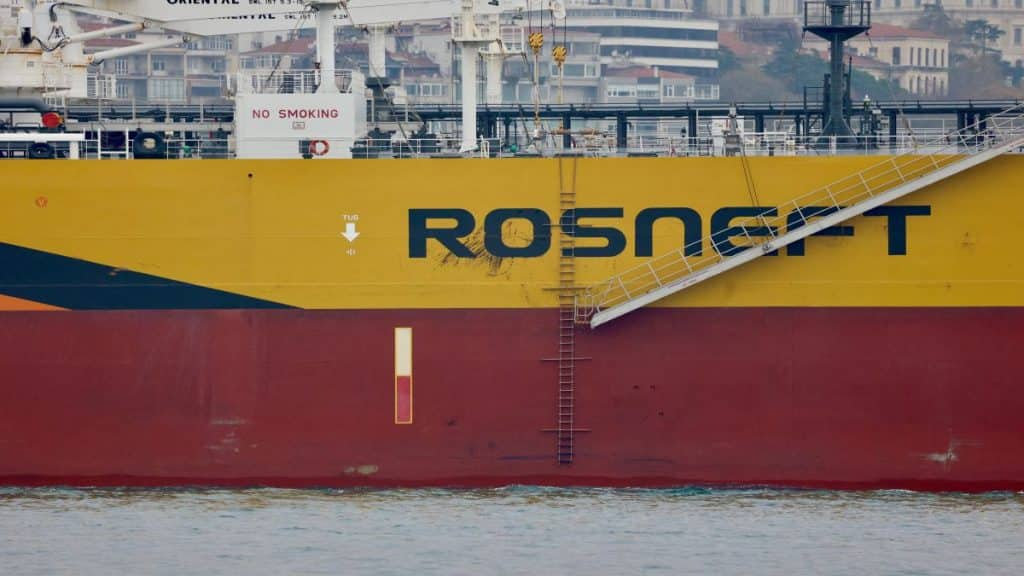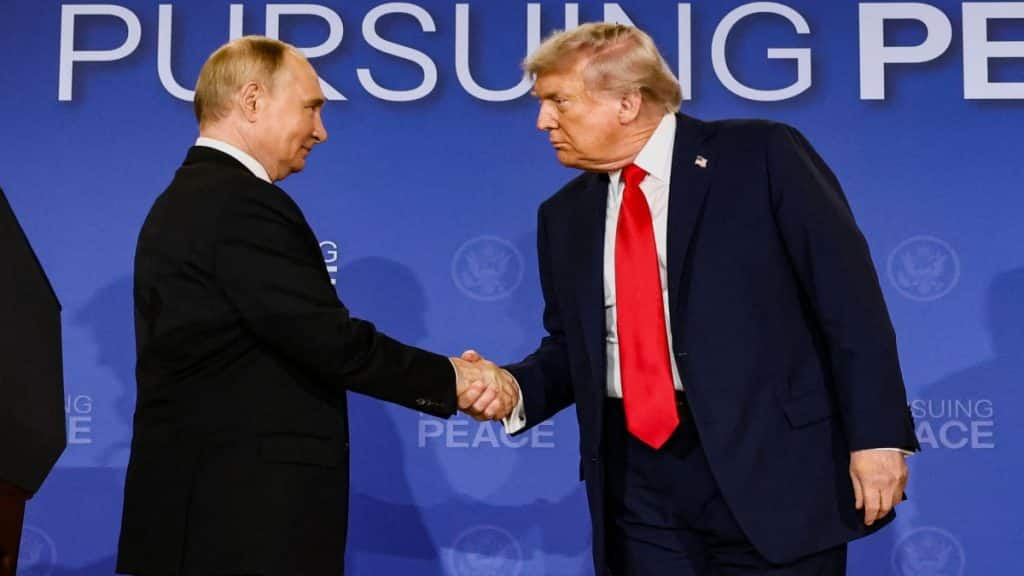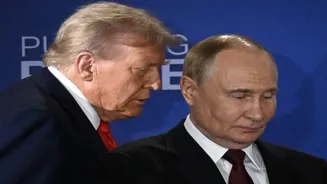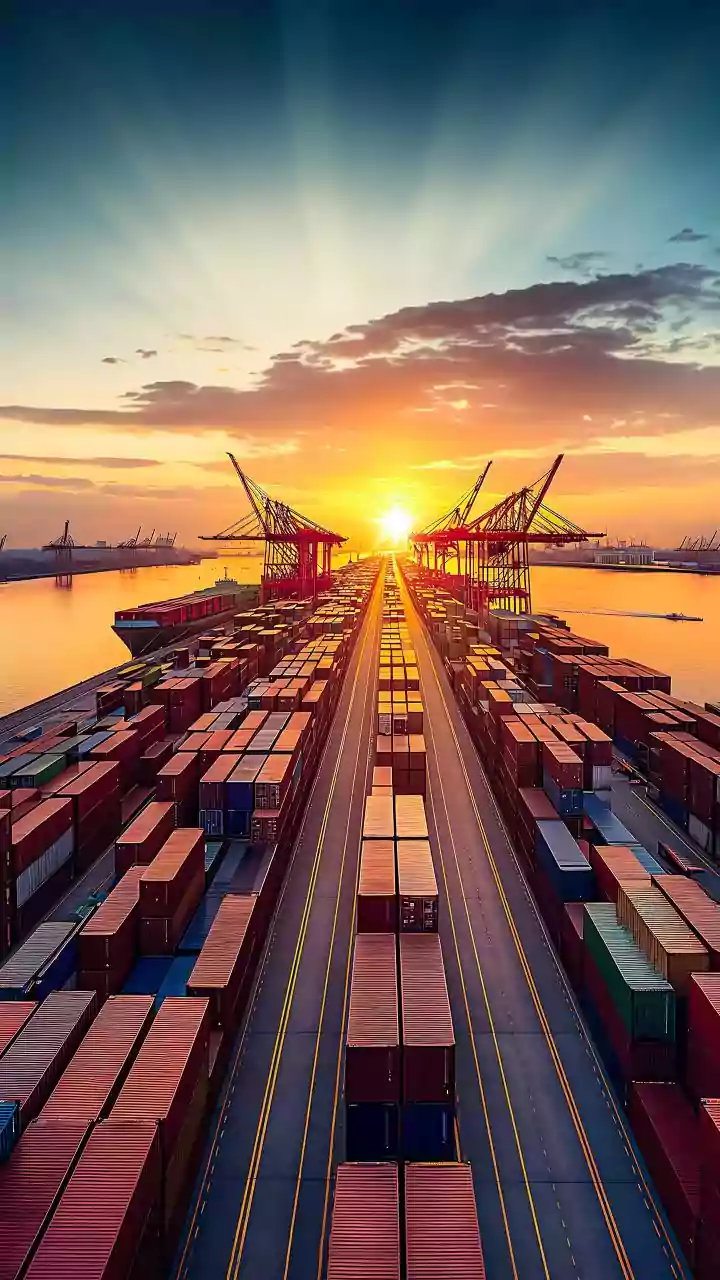What is the story about?
In this long-winding Russia-Ukraine war, we have seen many flip-flops from Donald Trump. But on Wednesday (October 22), came perhaps the most significant move by the American president as he announced the US would be levelling sanctions on two of Russia’s largest oil companies — Rosneft and Lukoil.
This is, indeed, a significant moment in the war; it marks the first time the Trump administration has imposed direct costs on Moscow over its full-scale invasion. Because, until now, the US president had been relying on trade measures such as sanctions — he has levelled secondary sanctions of 25 per cent on India for importing Russian crude.
For those who are thinking what’s the difference between a sanction and a tariff, we explain. Also, why has Trump now taken this step amid the war?
On Wednesday (October 22), the United States announced
new sanctions targeting Russia’s two largest oil companies — Rosneft and Lukoil. The two Russian oil firms export 3.1 million barrels of oil per day. Rosneft is responsible for nearly half of all Russian oil production, which makes up six per cent of the global output, according to estimates from the UK government.
The sanctions involve barring all US companies from doing any business with the two Russian oil titans.
Speaking on the sanctions, US President Donald Trump, in the presence of Nato Secretary General Mark Rutte, said that the sanctions “certainly will have an impact” on Russia and that he hopes Putin will “become reasonable.”
“These are tremendous sanctions, these are very big because they’re against their two big oil companies," Trump said, adding he hopes they won’t last long and a deal can be reached to end the war.
The US Treasury Department later announced that the sanctions will apply to oil companies Rosneft and Lukoil and some of their subsidiaries.
Notably, these US sanctions on Rosneft and Lukoil come just a week after the Keir Starmer-led British government also sanctioned these two firms. The European Union has already sanctioned Rosneft, the Russian state-owned oil company, but not Lukoil, which is privately owned, largely due to exemptions for Hungary and Slovakia, which buy Russian oil.
Rutte also praised the move, saying it was “putting more pressure” on Putin. “You have to put pressure, and that is just what he did today,” Rutte said.
Even Ukraine welcomed the news of Trump’s sanctions on Russian oil. Ukrainian Ambassador to the US, Olga Stefanishyna, said in a statement, “This decision fully aligns with Ukraine’s consistent position that peace can only be achieved through strength and by exerting maximum pressure on the aggressor using all available international instruments.”
The European Commission president, Ursula von der Leyen, also praised the new sanctions. “With the imminent adoption of the EU’s 19th [sanctions] package, this is a clear signal from both sides of the Atlantic that we will keep up collective pressure on the aggressor,” she wrote.
The sanctions are among the most significant measures that the United States has taken against the Russian energy sector since the beginning of the war in Ukraine. The Biden administration avoided levying sanctions against the companies to allow for legal purchases of Russian oil by American allies; targeting the companies could make a meaningful dent in Russia’s oil revenues.

The sanctions are a pivotal shift by Trump in the Russia-Ukraine war. Until now, he has been using tariffs to get Putin to accede to peace.
But what’s the difference? Tariffs are taxes on imported goods. They are used to protect domestic industries from foreign competition, generate revenue for the government or leverage economic pressure in trade negotiations.
Meanwhile, sanctions are in another league; they are economic or political measures enforced by one or more countries against another to exert pressure without resorting to military force. They can disrupt trade by limiting or prohibiting certain commercial activities.
There are different types of sanctions that can be imposed:
1) An economic sanction, which may include restrictions on trade, investment, or access to financial markets.
2) Diplomatic Sanctions include reducing or severing diplomatic ties.
3) Military Sanctions are arms embargoes, restrictions on military cooperation.
Experts note both sanctions and tariffs can have a significant impact. Sanctions, often blunt and broad, can have far-reaching consequences. They can cripple an entire economy, impacting all sectors of the targeted nation. However, tariffs are usually more surgical, affecting specific industries and trade relations between countries. Their impact can be felt in higher consumer prices and shifting trade patterns.
But what prompted Trump to levy the sanctions now on the Russian oil firms? The tough approach taken by the American leader is possibly an indicator of his frustration with Vladimir Putin to settle the Russia-Ukraine war.
In fact, Trump even criticised Putin while announcing the sanctions, saying the Russian leader wasn’t serious about peace. “I just felt it was time. We waited a long time,” Trump said.
Echoing similar sentiments, Trump’s Treasury Secretary, Scott Bessent said, “Now is the time to stop the killing and for an immediate ceasefire. Given President Putin’s refusal to end this senseless war, Treasury is sanctioning Russia’s two largest oil companies that fund the Kremlin’s war machine. Treasury is prepared to take further action if necessary to support President Trump’s effort to end yet another war. We encourage our allies to join us in and adhere to these sanctions.”

In a Fox News interview, Bessent even added on, “President Putin has not come to the table in an honest and forthright manner, as we’d hoped.”
The sanctions by US on Russian oil come just a day after Trump called off his Budapest summit with Putin, saying he felt it would be a “wasted meeting”. “Every time I speak with Vladimir, I have good conversations, and then they don’t go anywhere,” Trump said in response to a question from an AFP journalist in the Oval Office.
Trump has been unable to convince Putin to a ceasefire. Earlier, the US president urged his Russian counterpart to accept a ceasefire proposal that would freeze the conflict along the current battlelines, which Ukrainian President
Volodymyr Zelenskyy also expressed support. “We would like to see them just take the line that has been formed … and go home,” Trump said. “It’s time to make a deal. People are dying.”
But Moscow has been unwilling to change its stance on the war. The country’s Foreign Minister Sergei Lavrov said on Tuesday: “Washington now starts to say that we must stop [the conflict] immediately, that we should no longer discuss anything, that we should stop and let history judge.”
Moscow has consistently rejected extended ceasefire proposals, arguing they would give Ukraine time to rearm and regroup at a time when Russian forces are making battlefield advances. “You see, simply stopping would mean forgetting the root causes of this conflict,” Lavrov said. Those “root causes”, according to Moscow, refer to its sweeping demands that would undermine Ukraine’s sovereignty – including full control over the Donbas region, limits on Kyiv’s armed forces and a say in its domestic affairs.
It’s anyone’s guess where the war goes from here — will the sanctions get Putin to the negotiating table or will it further push him to battle on.
With inputs from agencies
This is, indeed, a significant moment in the war; it marks the first time the Trump administration has imposed direct costs on Moscow over its full-scale invasion. Because, until now, the US president had been relying on trade measures such as sanctions — he has levelled secondary sanctions of 25 per cent on India for importing Russian crude.
For those who are thinking what’s the difference between a sanction and a tariff, we explain. Also, why has Trump now taken this step amid the war?
Trump imposes sanctions on Russian oil
On Wednesday (October 22), the United States announced
The sanctions involve barring all US companies from doing any business with the two Russian oil titans.
Speaking on the sanctions, US President Donald Trump, in the presence of Nato Secretary General Mark Rutte, said that the sanctions “certainly will have an impact” on Russia and that he hopes Putin will “become reasonable.”
Trump asked why new Russia sanctions now: 'I just felt it was time'
On conflict: 'I think we’ll get that done too'
Yes-man Rutte by his side: 'absolutely. We have to' https://t.co/vwNX1AXiZa pic.twitter.com/pTxfaWCa4A
— RT (@RT_com) October 22, 2025
“These are tremendous sanctions, these are very big because they’re against their two big oil companies," Trump said, adding he hopes they won’t last long and a deal can be reached to end the war.
The US Treasury Department later announced that the sanctions will apply to oil companies Rosneft and Lukoil and some of their subsidiaries.
Notably, these US sanctions on Rosneft and Lukoil come just a week after the Keir Starmer-led British government also sanctioned these two firms. The European Union has already sanctioned Rosneft, the Russian state-owned oil company, but not Lukoil, which is privately owned, largely due to exemptions for Hungary and Slovakia, which buy Russian oil.
Rutte also praised the move, saying it was “putting more pressure” on Putin. “You have to put pressure, and that is just what he did today,” Rutte said.
Even Ukraine welcomed the news of Trump’s sanctions on Russian oil. Ukrainian Ambassador to the US, Olga Stefanishyna, said in a statement, “This decision fully aligns with Ukraine’s consistent position that peace can only be achieved through strength and by exerting maximum pressure on the aggressor using all available international instruments.”
The European Commission president, Ursula von der Leyen, also praised the new sanctions. “With the imminent adoption of the EU’s 19th [sanctions] package, this is a clear signal from both sides of the Atlantic that we will keep up collective pressure on the aggressor,” she wrote.
The sanctions are among the most significant measures that the United States has taken against the Russian energy sector since the beginning of the war in Ukraine. The Biden administration avoided levying sanctions against the companies to allow for legal purchases of Russian oil by American allies; targeting the companies could make a meaningful dent in Russia’s oil revenues.

Rosneft's Russian-flagged crude oil tanker Akademik Gubkin transits the Bosphorus in Istanbul, Turkey. Rosneft is responsible for nearly half of all Russian oil production, which makes up six per cent of the global output. File image/Reuters
Difference between sanctions and tariffs
The sanctions are a pivotal shift by Trump in the Russia-Ukraine war. Until now, he has been using tariffs to get Putin to accede to peace.
But what’s the difference? Tariffs are taxes on imported goods. They are used to protect domestic industries from foreign competition, generate revenue for the government or leverage economic pressure in trade negotiations.
Meanwhile, sanctions are in another league; they are economic or political measures enforced by one or more countries against another to exert pressure without resorting to military force. They can disrupt trade by limiting or prohibiting certain commercial activities.
There are different types of sanctions that can be imposed:
1) An economic sanction, which may include restrictions on trade, investment, or access to financial markets.
2) Diplomatic Sanctions include reducing or severing diplomatic ties.
3) Military Sanctions are arms embargoes, restrictions on military cooperation.
Experts note both sanctions and tariffs can have a significant impact. Sanctions, often blunt and broad, can have far-reaching consequences. They can cripple an entire economy, impacting all sectors of the targeted nation. However, tariffs are usually more surgical, affecting specific industries and trade relations between countries. Their impact can be felt in higher consumer prices and shifting trade patterns.
Timing of the US sanctions on Russian oil
But what prompted Trump to levy the sanctions now on the Russian oil firms? The tough approach taken by the American leader is possibly an indicator of his frustration with Vladimir Putin to settle the Russia-Ukraine war.
In fact, Trump even criticised Putin while announcing the sanctions, saying the Russian leader wasn’t serious about peace. “I just felt it was time. We waited a long time,” Trump said.
Echoing similar sentiments, Trump’s Treasury Secretary, Scott Bessent said, “Now is the time to stop the killing and for an immediate ceasefire. Given President Putin’s refusal to end this senseless war, Treasury is sanctioning Russia’s two largest oil companies that fund the Kremlin’s war machine. Treasury is prepared to take further action if necessary to support President Trump’s effort to end yet another war. We encourage our allies to join us in and adhere to these sanctions.”

Donald Trump's tough approach is possibly an indicator of his frustration with Vladimir Putin to settle the Russia-Ukraine war. File image/Reuters
In a Fox News interview, Bessent even added on, “President Putin has not come to the table in an honest and forthright manner, as we’d hoped.”
The sanctions by US on Russian oil come just a day after Trump called off his Budapest summit with Putin, saying he felt it would be a “wasted meeting”. “Every time I speak with Vladimir, I have good conversations, and then they don’t go anywhere,” Trump said in response to a question from an AFP journalist in the Oval Office.
Trump has been unable to convince Putin to a ceasefire. Earlier, the US president urged his Russian counterpart to accept a ceasefire proposal that would freeze the conflict along the current battlelines, which Ukrainian President
But Moscow has been unwilling to change its stance on the war. The country’s Foreign Minister Sergei Lavrov said on Tuesday: “Washington now starts to say that we must stop [the conflict] immediately, that we should no longer discuss anything, that we should stop and let history judge.”
Moscow has consistently rejected extended ceasefire proposals, arguing they would give Ukraine time to rearm and regroup at a time when Russian forces are making battlefield advances. “You see, simply stopping would mean forgetting the root causes of this conflict,” Lavrov said. Those “root causes”, according to Moscow, refer to its sweeping demands that would undermine Ukraine’s sovereignty – including full control over the Donbas region, limits on Kyiv’s armed forces and a say in its domestic affairs.
It’s anyone’s guess where the war goes from here — will the sanctions get Putin to the negotiating table or will it further push him to battle on.
With inputs from agencies

























